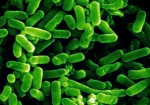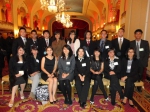SynBio Club ITB Offers Solutions Through Synthetic Biology
By Neli Syahida
Editor Neli Syahida

ITB students contribute to the health and environmental issues via SynBio Club ITB. Through Synbio Seminar held on Saturday (05/02/15) at the Indonesian Corner Perpustakaan Pusat ITB, Synbio Club ITB introduced to the public. This seminar presents three innovative and experienced young speaker: Tirta Widi Gilang (Biology 2013), Tri Ekawati Heryanto (iGEM 2014), and Asteria Pitasari (iGEM 2015). Tirta and Eka are the winner of the iGEM (International Genetically Engineered Machine) competition in Boston, USA last year. The seminar which was attended by 50 participants presents in a two-way discussion system, triggering enthusiasm of participants from diverse backgrounds, such as students of various departments and experts in the field of biological engineering.
Know Synthetic Biology from up-close
Synthetic biology is science and production process of materials using the principles of biology and engineering. "Only with the codes in DNA, we can solve the problem," said Tirta. At first, synthetic biology is introduced in the Massachusetts Institute of Technology (MIT). Then, these knowledges grew rapidly at Europe in 2008 as biology an engineering developed thru time.
ITB Accomplishments on iGEM Competition
International Genetically Engineered Machine (iGEM) is a synthetic biology competition, followed by students of international level since 2003 and held twice a year. ITB started to participate at Hongkong in 2013. On that year, iGEM ITB team made Aflatoxin sensor (toxins produced by Aspergillus flavus fungus, usually found in nuts) utilizes injection devices which have membranes containing bacteria that can change color when detecting aflatoxin. This invention successfully led ITB get the gold medal.
On iGEM 2014 at Boston, ITB team made ColiPlaster: PET Degradator that took advantages of whole-cell biocatalyst principle (biocatalyst using whole cell bodies) with bacteria that produced cutinase enzyme. DNA encoding the enzyme is inserted in the DNA of bacteria, the enzyme is produced and attached to the protein in the outer membrane of the cell, so that when there is contact with plastic, it directly degraded into terephthalic acid and ethylene glycol. Dangerous ethylene glycol used as a nutrient for bacteria using the help of other enzymes. If the bacteria have started to wear out, the bacteria will send a signal and turned blue. Automatically, the bacteria will repair itself using protein. The discovery that was awarded the gold medal successfully arouses the spirit of ITB students to work in the field of Synthetic Biology. This year, iGEM ITB 2015 team plan to make biosurfactant utilize fatty compounds (rhamnolipid) from Pseudomonas. These compounds can be used as a solution to the problem of waste oil and biodiesel. Hopefully this research can help many industries in the future.

.jpg)
.jpg)
.jpg)
.jpg)
.jpg)
.jpg)


